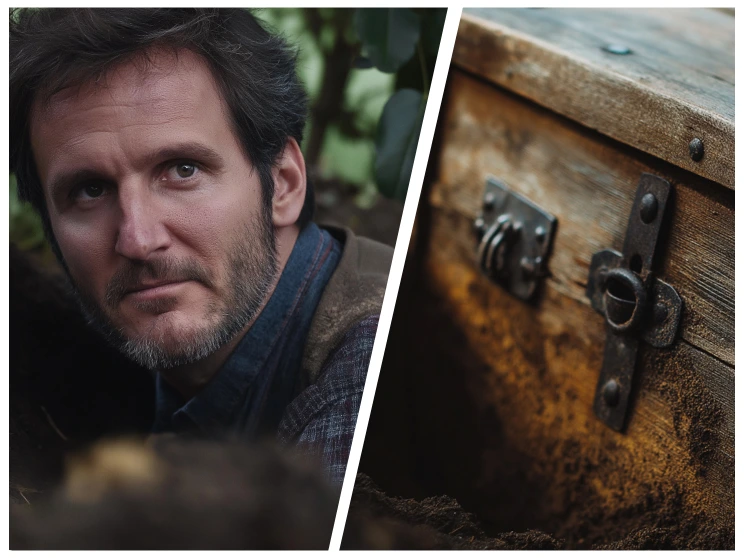The spade struck metal with a dull, hollow clang. Andrew froze, sweat dripping into his eyes despite the chill evening air. He knelt lower, scraping dirt away until a corner of something hard emerged. The garden’s soil, heavy and damp, reluctantly surrendered what had been buried deep for decades.
With each heave of the shovel, the outline grew clearer—an iron-bound chest, its wood swollen with age. Andrew’s pulse quickened as he tugged at the corroded handles. The weight surprised him. Whatever lay inside had remained undisturbed, perhaps untouched since the war years his uncle had lived through.
He dragged the chest onto the grass, panting, fingers trembling on the clasp. For a moment, he hesitated. His mind conjured all the whispered family rumors: murder, stolen wealth, dark secrets his uncle never spoke of. What if this chest confirmed the worst suspicions about the old man?
Andrew had never wanted the estate. The letter from the solicitor felt more like a burden than a windfall. A sprawling, crumbling mansion miles from anywhere, ivy twisting across cracked stone, shutters sagging on rusted hinges. His uncle’s property was an anchor to the past he hardly cared to revisit.
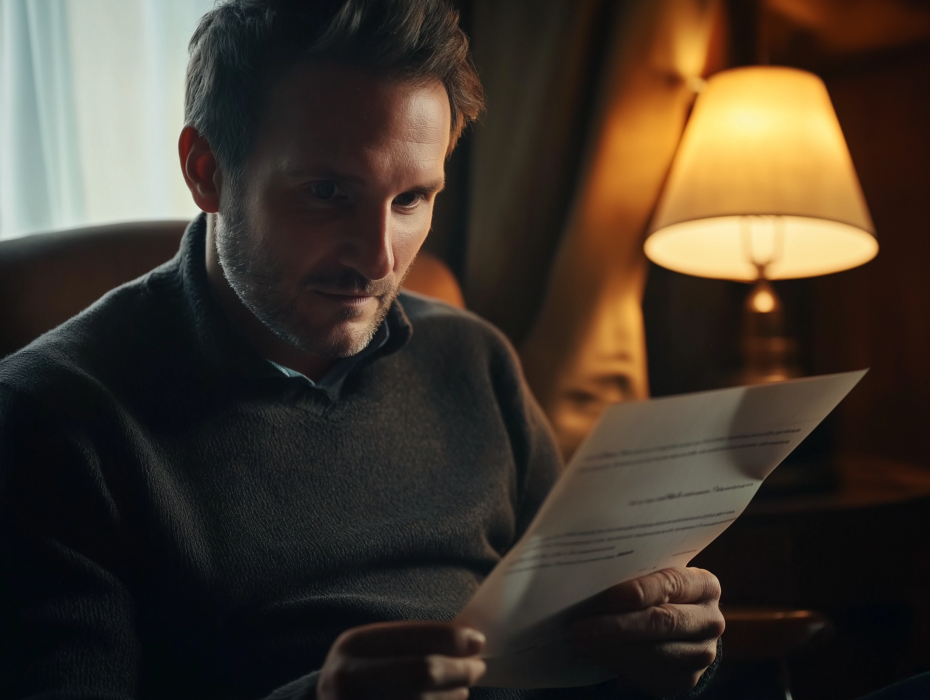
He remembered Henry Somerton as a stern and solitary man. His father’s younger brother, a mathematics professor at a modest college. Henry rarely attended family gatherings, and when he did, he lingered at the edge, polite but detached, eyes shadowed by private storms no one else could glimpse.
The inheritance documents were straightforward—house, grounds, garden. But walking through those decaying corridors unsettled Andrew. Wallpaper peeled in curling strips, chandeliers sagged, and the air was thick with mildew. He felt like an intruder, as if Henry’s silence still pressed down on every room, suffocating and judging.
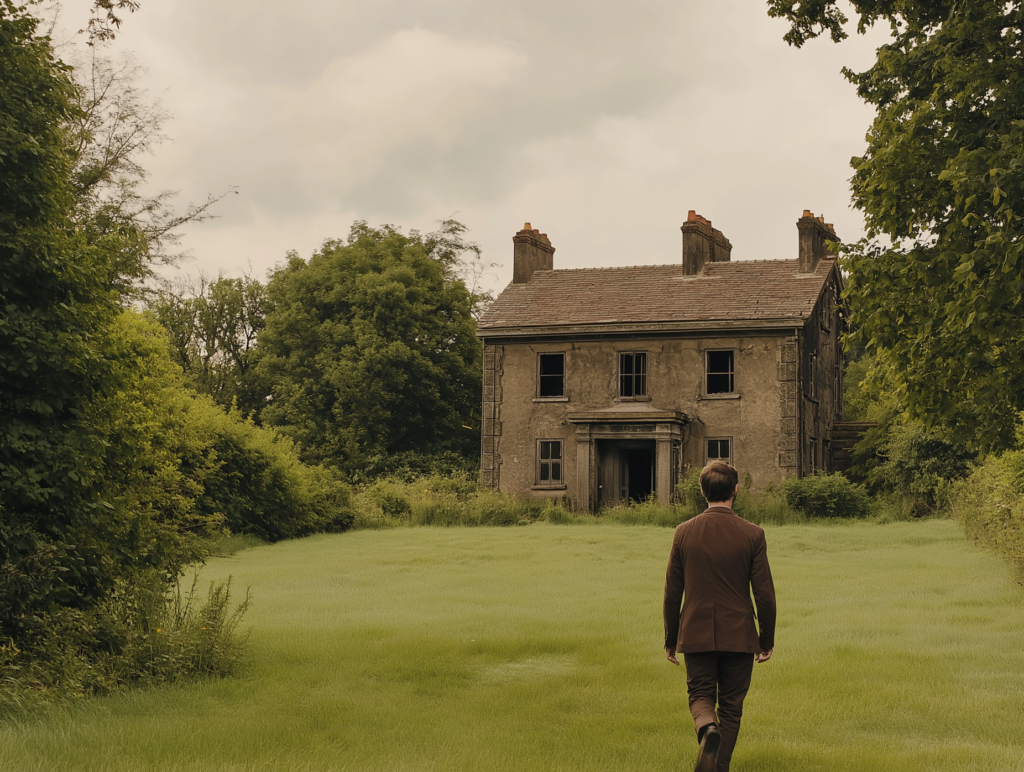
The strangest legacy, though, was the house’s whispers. Villagers in the nearby pub murmured about Henry, about his tragic wife. She had fallen down the stairs decades ago, breaking her neck. The coroner ruled it an accident. But locals muttered otherwise—that Henry had pushed her, and that his coldness hid something darker.
No proof ever surfaced. No charges were filed. Yet the rumor clung like the ivy on the building, choking his memory. Andrew remembered overhearing hushed arguments as a child—his father insisting Henry was innocent, his mother whispering that innocence didn’t explain such distance, such refusal to ever remarry or rebuild a life.
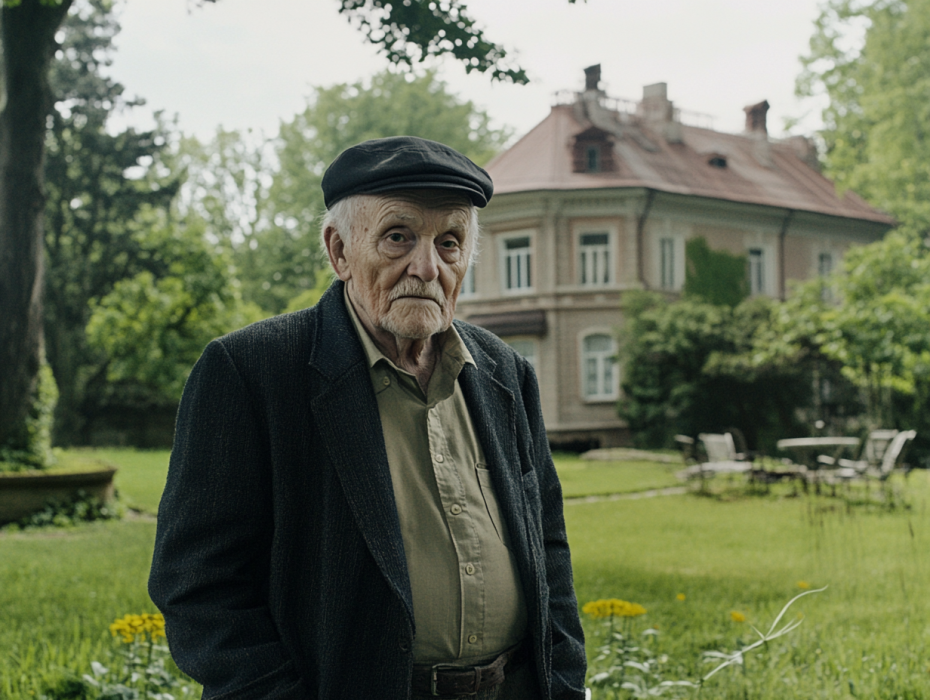
It troubled him now, pacing through the house’s echoing hallways. Henry had died alone, no children, no companions, and no friends close enough to eulogize him. What kind of man clung to a decaying estate until his last breath, refusing to let anyone inside, as though protecting something more than bricks?
Then there was the locked East wing. It had remained unopened for decades together, and no one exactly knew what it held. The rooms there were mostly those belonging to Andrew’s late aunt, but sealed as it was, nobody, including the caretaker, had set foot inside it for years. At least that, Andrew knew, he could have it opened soon.
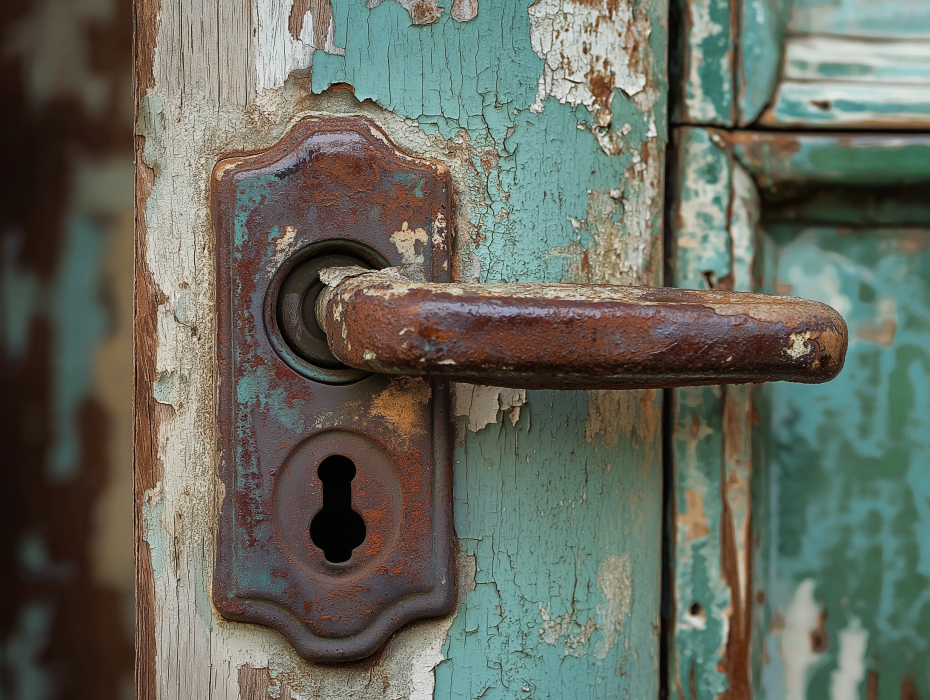
The deed to the estate gave him no comfort. He skimmed it idly at first, only to frown. The word “garden” repeated with unusual frequency, far beyond necessity. Why emphasize it so much? The phrasing felt deliberate, out of rhythm, almost like a riddle disguised as a legal conundrum.
Andrew read the deed again that evening, light flickering over its faded ink. The repetition was too precise to be an error. “House, garden, and garden grounds.” “Garden to be preserved in perpetuity.” Each phrase landed like a dropped stone. The garden wasn’t just mentioned, but practically shouted from every page.
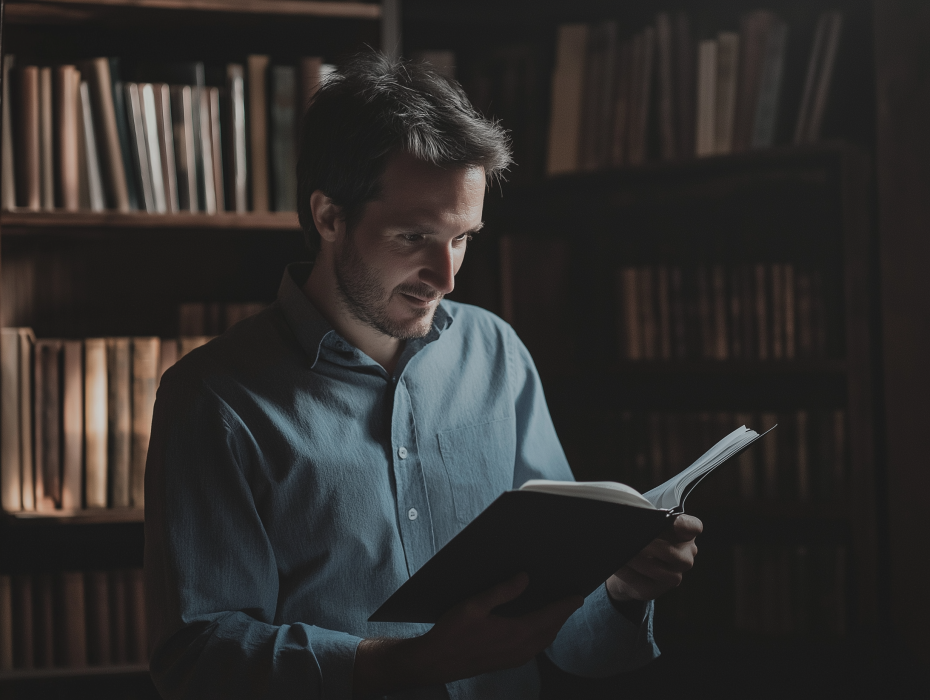
He muttered aloud, “Why the garden, Uncle?” The house made sense, the land too, but why the obsessive emphasis on overgrown hedges and moulding statues? He shoved the document away, irritated. Yet when he closed his eyes that night, the word still pulsed behind his eyelids: garden, garden, garden…
The next day, he carried the deed into the village. Mrs. Linton, the elderly caretaker who had known Henry for decades, squinted at the paper. “Odd, that,” she said, pointing to the repetitions. “Your uncle loved puzzles. He solved every single crossword in every newspaper. I believe he even made up a few. Maybe he left you one final riddle?”
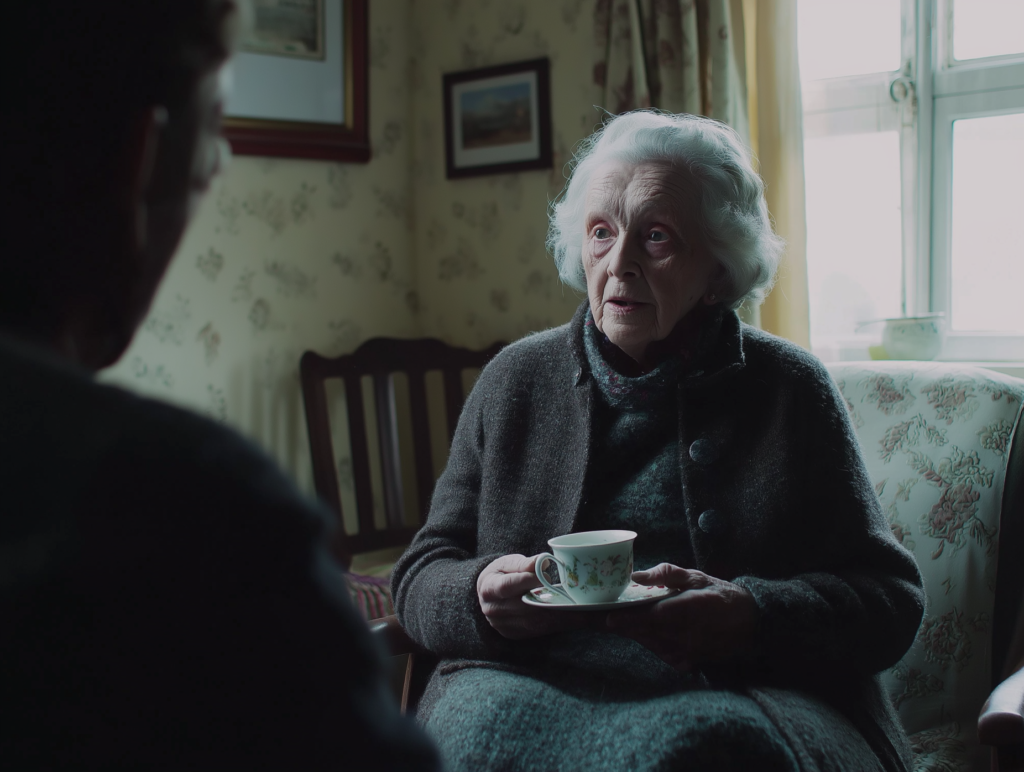
Her words unsettled him more than he cared to admit. He asked about Henry’s wife, but Mrs. Linton only pursed her lips. “Terrible tragedy. People talk, but no one knows. Still, he wasn’t a man you could easily understand. Always seemed… elsewhere, even when he was standing in front of you.”
Andrew pressed for more, but she shook her head. “Let sleeping dogs lie, Mr. Somerton. The past doesn’t like being dug up.” Her tone was sharp enough to sting. He left the cottage with the deed tucked under his arm, unease gnawing deeper than before.

At the archives, dust motes danced in cold shafts of light as he scrolled through yellowing microfilm. His uncle’s name surfaced only occasionally—mathematics appointments, published letters, and lectures on probability. But once, briefly, Henry was mentioned in connection with “classified assistance to the War Office.” There was only the hint of a shadow.
The phrase jolted Andrew. His uncle, part of something “classified”? He pressed the archivist for details, but the man shrugged. “Postwar article. Hundreds of academics were roped into the war effort. Codebreaking, logistics, who knows? Most records remain sealed. Odd, though. Why would the man keep it so hush-hush?”
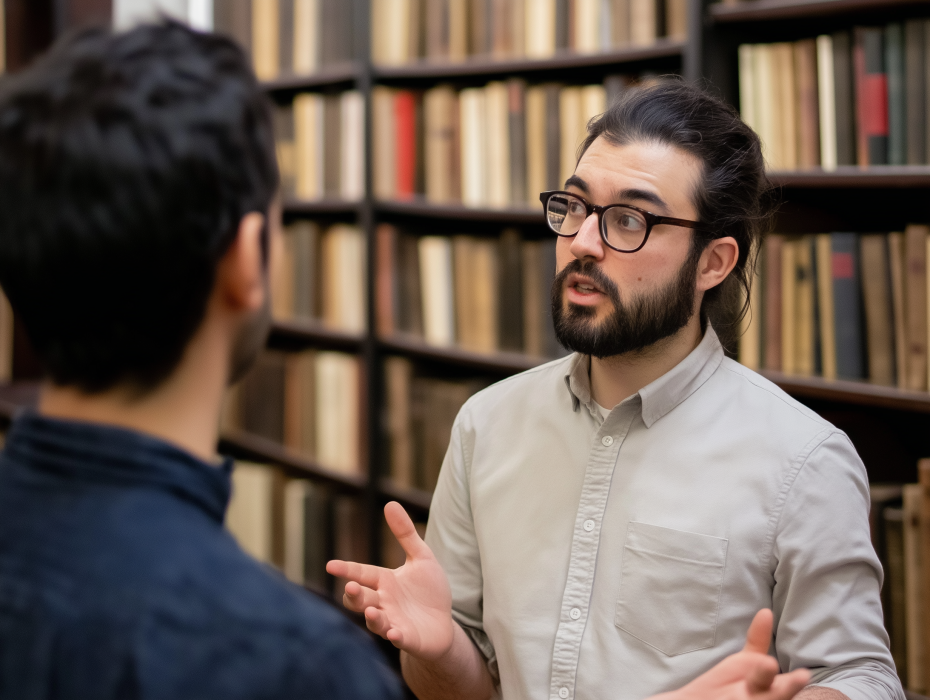
Back at the estate, Andrew spread the deed across the desk, tracing words with his finger. The archivist’s words and Mrs. Linton’s warning gnawed at him. Henry’s silence, his wife’s suspicious death, his reclusion. The garden references formed an itch in Andrew’s mind— deliberate and patterned, like the beginning of code.
He scrawled numbers in the margins, counting every third word, then every fifth, then mapping phrases by repetition. At first, it yielded nothing. Then something shifted: the placements aligned, sketching coordinates, as if Henry had hidden directions in plain sight. Andrew’s pulse quickened. The deed wasn’t legal prose—it was a cipher!

Excitement battled dread. He marked the garden sketch, overlaying Henry’s coordinates onto faded blueprints of the grounds. One particular spot glowed with eerie certainty. It was a neglected patch near a crooked oak, half-swallowed by weeds. Andrew stared at it, whispering, “What is your secret, Uncle?”
The telephone rang just then, shrill in the quiet house. Andrew startled, dust rising as he lifted the receiver. A clipped voice rasped something unintelligible. Then silence, and the line went dead. His skin prickled. It seemed he had ill-wishers even before he took charge of the old place!
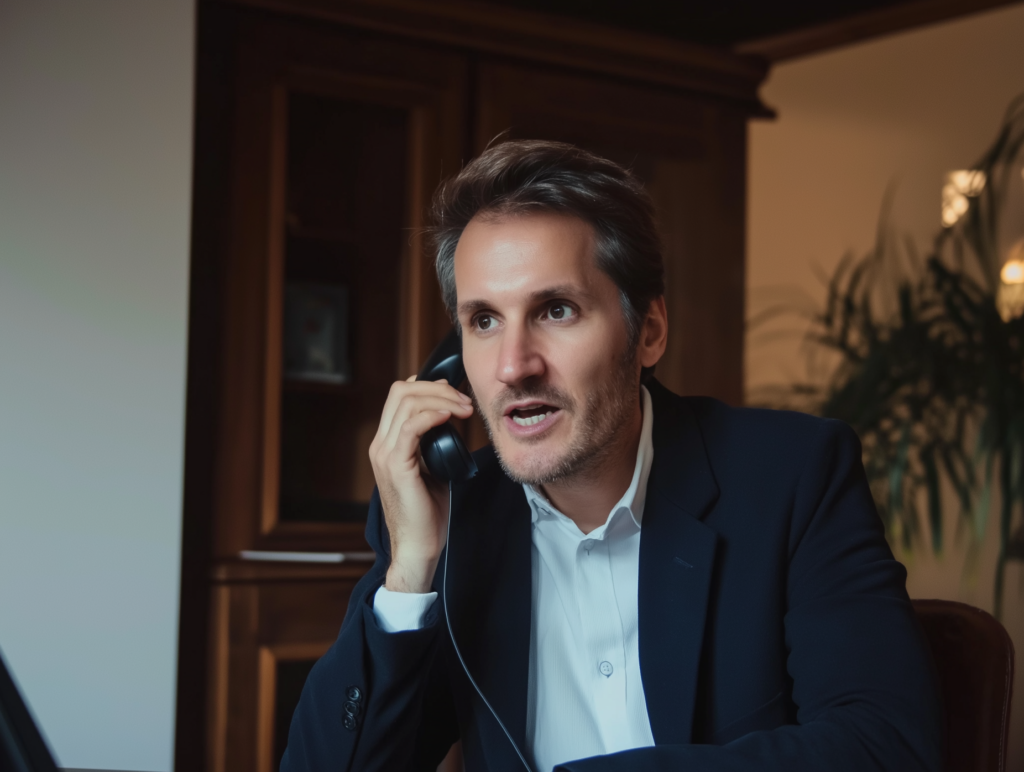
The next morning, Andrew carried a spade across the dew-damp grass. The air smelled of wet leaves and moss, the garden heavy with silence. He stopped beneath the crooked oak marked on his sketch. To anyone else, it was just overgrown ground. To him, it was a promise of answers.
He set the blade into the soil. The earth gave reluctantly, clods breaking apart with worms writhing in the light. Sweat gathered quickly despite the chill. Each strike of the shovel thudded with anticipation. His heart thumped louder. He was certain—this was the spot Henry had wanted him to find.
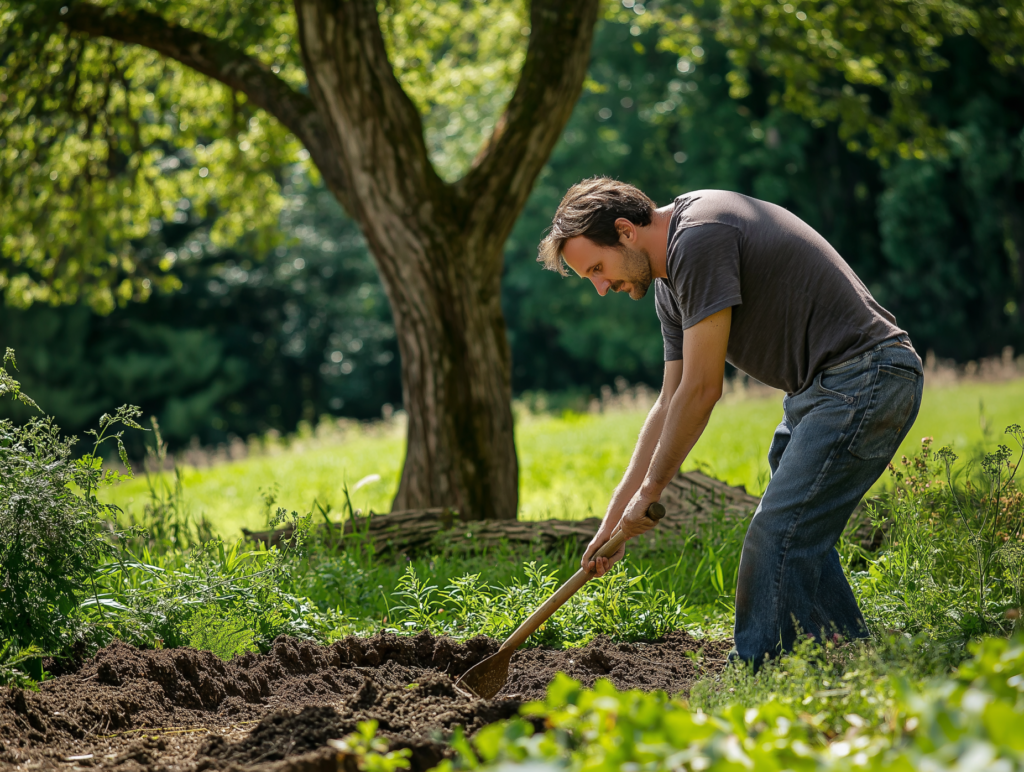
Minutes stretched into hours. The hole deepened, soil piled high around him. Roots clawed back at his progress. His arms ached, his breath grew ragged. But nothing surfaced—no box, no clue, just black earth and stubborn stones. His excitement dissolved into frustration. Had he misunderstood the cipher completely?
Andrew climbed out of the pit, staring down at his work. The ground mocked him with its emptiness. Perhaps Mrs. Linton was right, and he was chasing shadows. The deed’s repetitions might have been nothing more than quirks of wording. He wiped mud from his hands, trying to swallow disappointment.
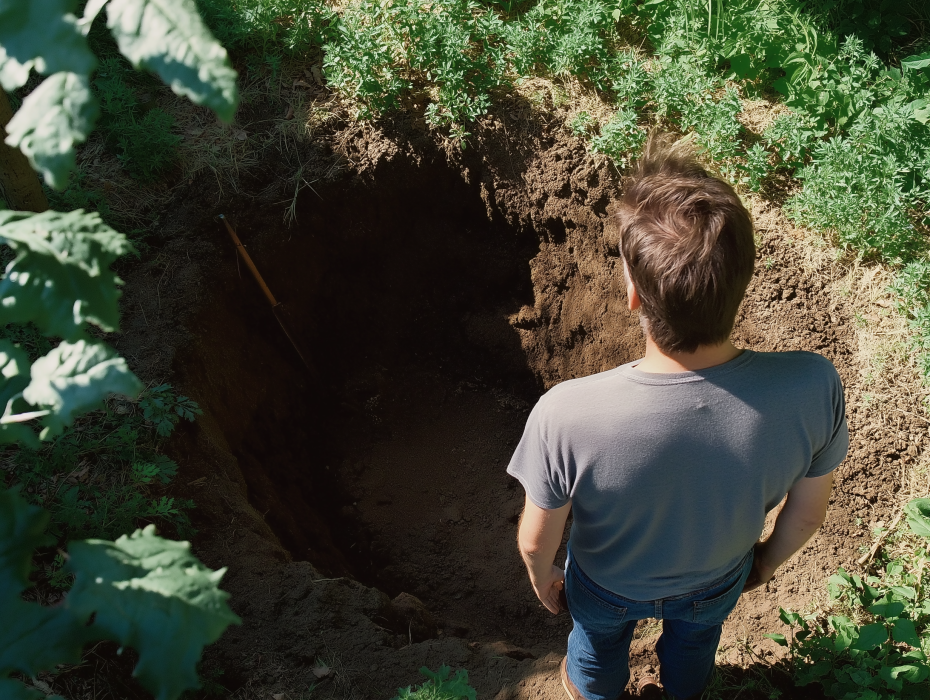
Yet doubt quickly turned into suspicion. What if Henry had meant to mislead? Or worse, what if someone had already found the cache years earlier? He imagined thieves prying open a treasure chest in the night, stealing whatever secrets it contained, leaving nothing behind but dirt to torment him.
Restlessness drove him back to the deed. He traced the coordinates again, testing variations. The pattern shifted if he adjusted for omissions, for faded words. He scribbled fresh notes, redrawing the garden’s map. Suddenly, a new point emerged, not far from the first—slightly offset, but close enough to matter.
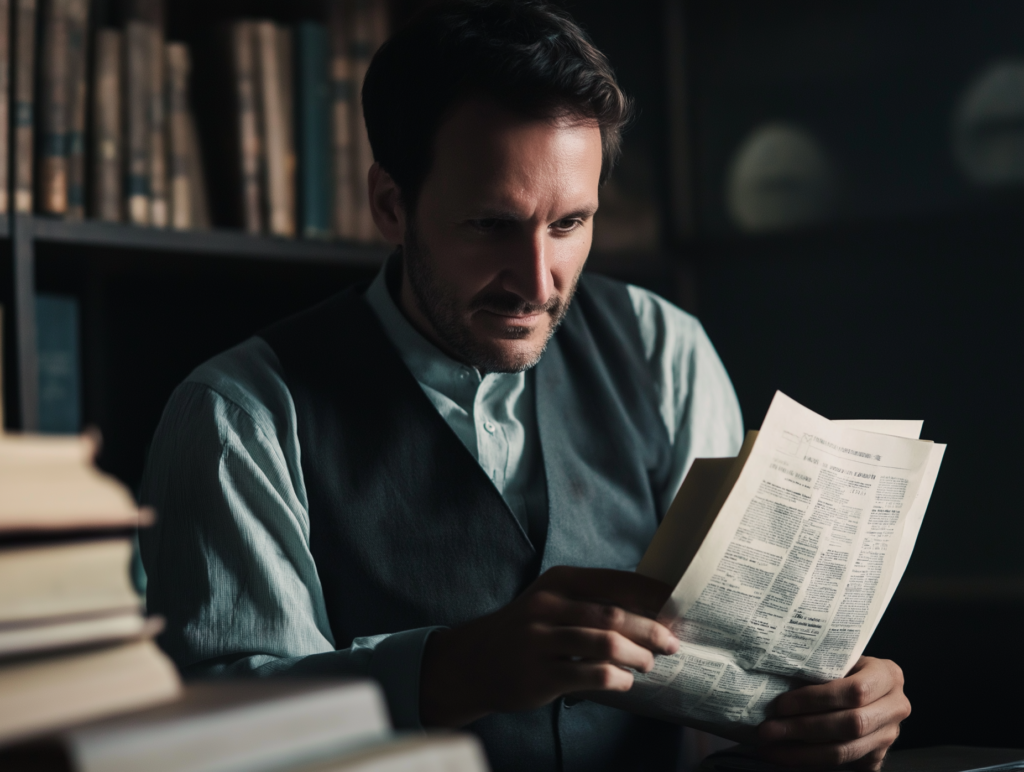
It made sense. Decades had passed since Henry drew the cipher. Land shifted, trees grew, roots spread. The exact spot might have moved, buried deeper under years of neglect. Andrew’s pulse quickened with renewed purpose. He had been close. The mistake was not failure—only time itself rearranging.
At dawn, he returned with renewed determination. The garden stretched before him like a battlefield. He measured steps carefully, realigning his map. The new point fell near a broken sundial, half-buried in weeds. Andrew jammed his spade into the ground, hope and dread clashing in every movement.
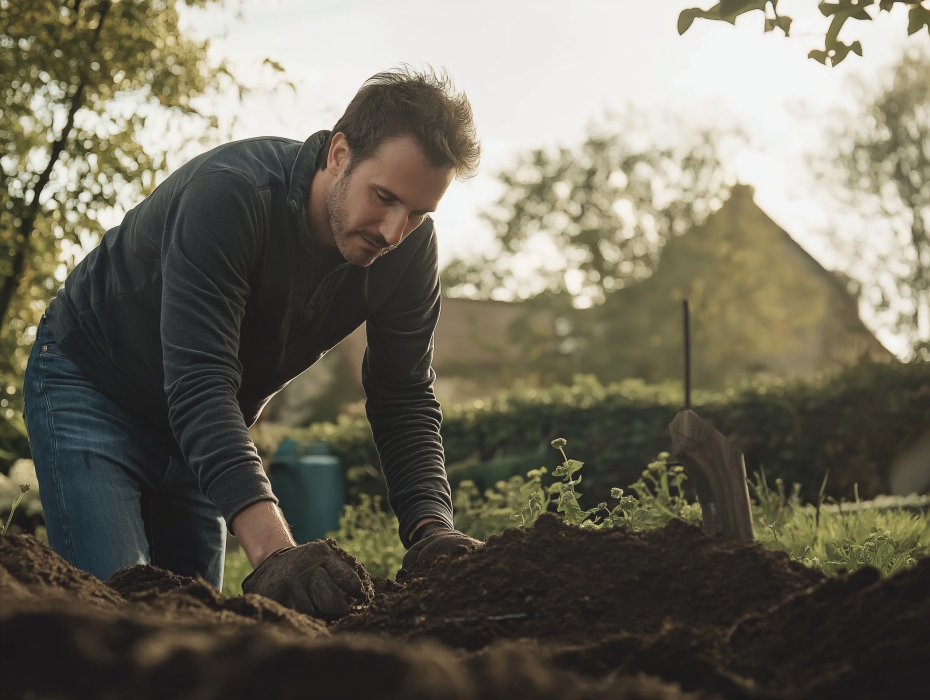
Again, the earth resisted. Hours passed with no glint of metal, no creak of wood. Andrew cursed, sweat dripping into his eyes. He feared he had miscalculated once more. Yet even as exhaustion set in, something inside whispered: keep digging. The garden still had secrets, and Henry wanted to find them.
Frustration gnawed at him. Andrew packed the muddy spade into his car and drove back to the village. The archives clerk remembered him and raised an eyebrow at his return. Andrew unfolded the deed, showing his markings, asking whether such codes had ever been used in official documents before.
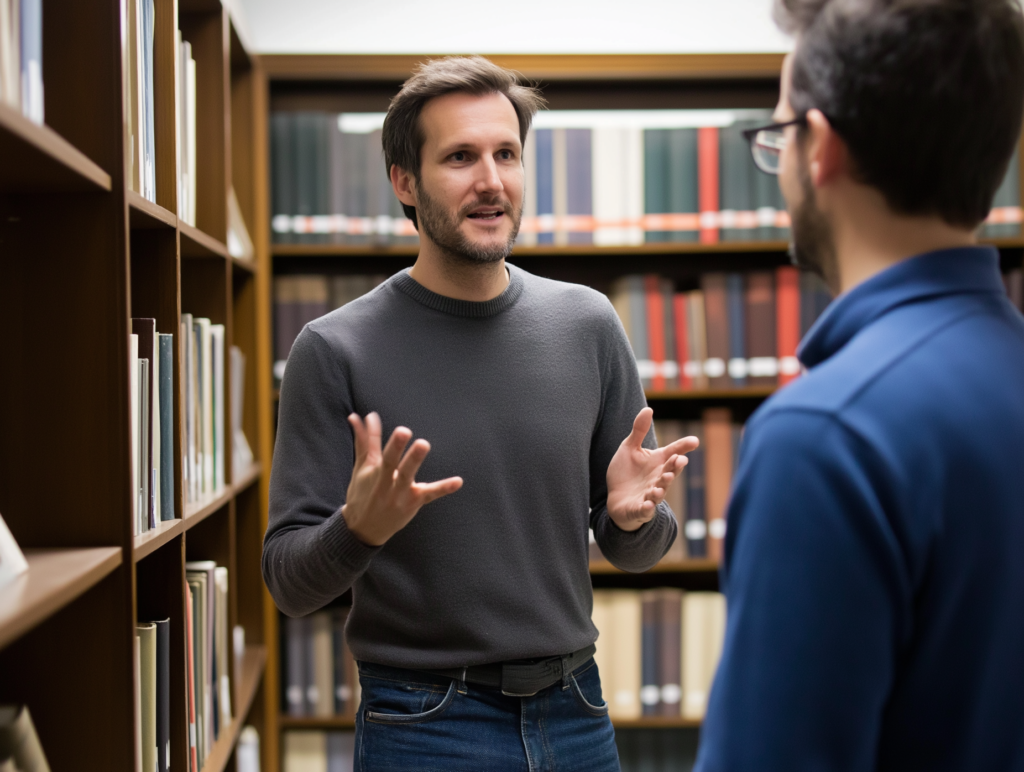
The clerk chuckled uneasily. “Not in deeds, no. But codes were everywhere during the war. Some of the professors here helped with them. Hidden signals in ordinary texts, maps disguised as poetry. Clever ways to communicate without ever appearing suspicious. Your uncle could have done the same.”
The remark struck Andrew hard. He leaned in, pressing, “So he might have been involved with intelligence work?” The clerk shrugged. “Possible. But those files are sealed, and will likely remain sealed for decades. Best not to pry too deeply. Some things were meant to stay classified forever.”
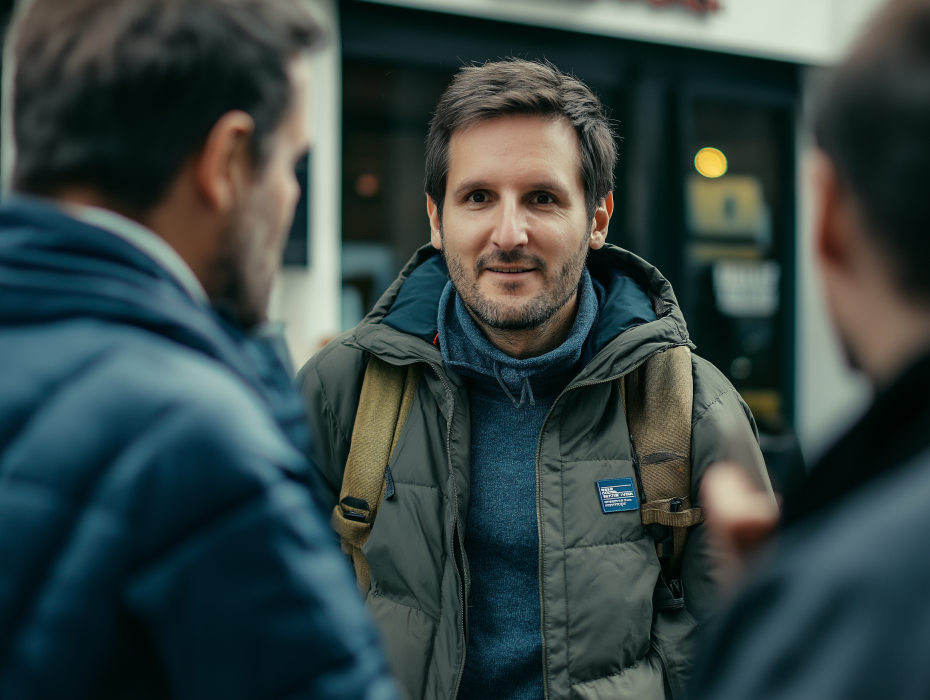
Walking through the village, Andrew overheard whispers. Two men outside the pub spoke in low tones: “That’s the estate’s new master. That place’s cursed.” “Didn’t his uncle’s wife fall down the stairs?” “Fall, my foot. He pushed her.” The venom in their voices sent a chill racing up Andrew’s spine.
He ducked into the pub, nursing a pint while eavesdropping. Later, the pub owner laughed when Andrew described the call he got. “Locals do that sometimes. A prank, to “welcome” the new owner. Superstition runs deep here. Don’t take it seriously.” But Andrew couldn’t shake the unease. Could the call have been something more?
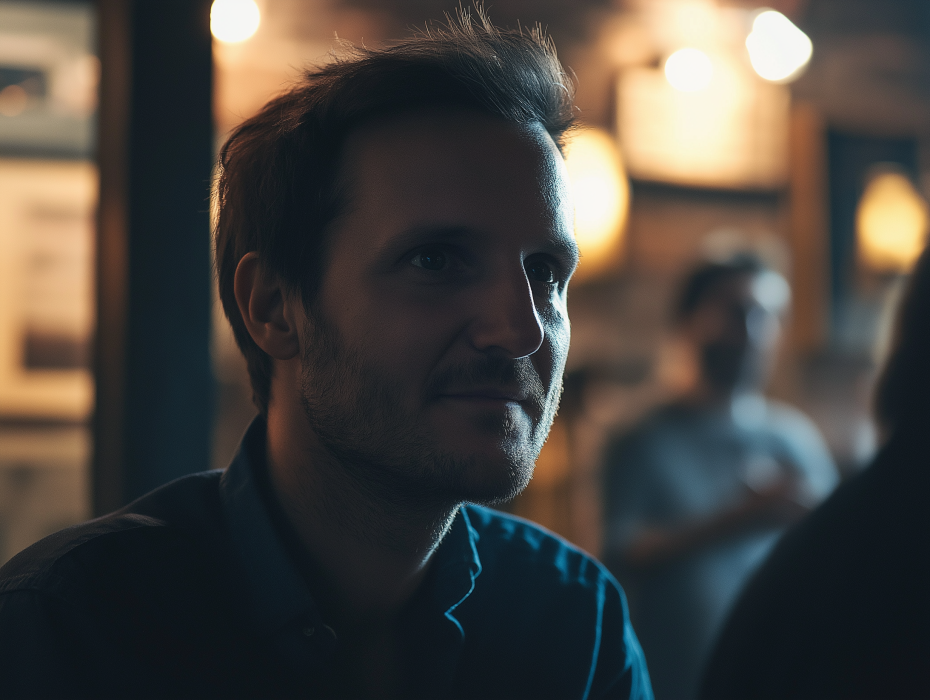
Back at the estate, he spread his notes across the study desk, light flickering. He scrawled variations of the cipher, adjusting for shifts, recalculating. Slowly, a new alignment appeared, farther into the garden than before. His pulse quickened. Perhaps he had been too quick to mark the spot close to the oak.
The new coordinates pointed to the ground near the crumbling garden wall. Ivy strangled broken stone, weeds tall as his waist. It felt abandoned, forgotten. Andrew stared out the window, imagining his uncle in wartime, hiding something precious in the earth no one would think to disturb.
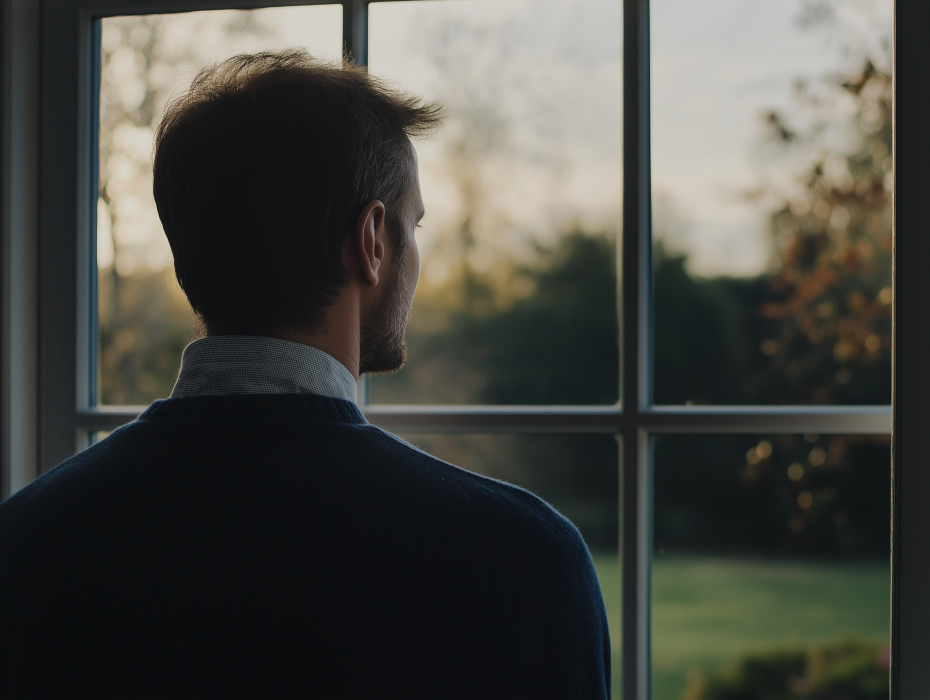
Still, unease persisted. What if it wasn’t treasure or letters? What if bones lay beneath? His aunt’s death was never fully explained; her fall was whispered about for decades. He saw Henry in his mind—cold, reticent, and haunted. The chest he sought might not absolve him. It might condemn him entirely.
That night, he dreamt of the staircase again. His aunt’s figure tumbled endlessly, her cry frozen in time. At the bottom, she pointed toward the garden, accusing. Andrew woke, trembling, sweat soaking the sheets. The estate seemed to breathe around him, as though Henry’s secrets infected the very walls.
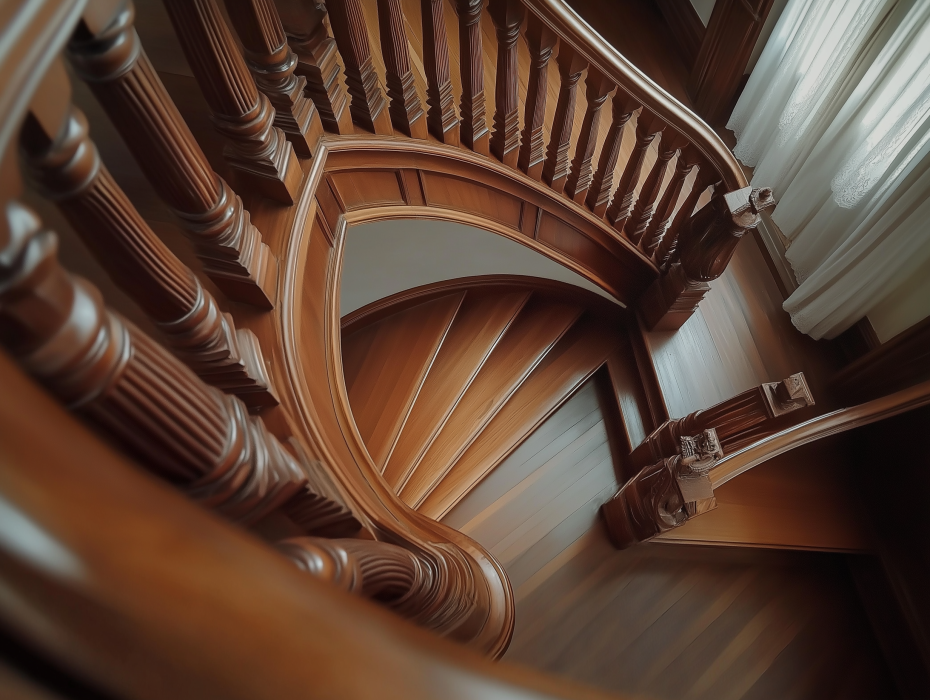
Dawn brought mist curling low across the garden, dampening Andrew’s boots as he approached the wall. Tools in hand, he hacked through weeds until bare soil emerged. The sundial and oak loomed behind him, silent sentinels. This time, he promised himself, he would dig until the ground surrendered its secret.
The shovel bit deep, soil crumbling away in stubborn clumps. Hours passed, arms trembling, sweat dripping into his eyes. He paused only to stretch aching muscles. But the hole revealed nothing—no chest, no metal, just endless earth. Frustration flared. Had Henry crafted a puzzle with no solution?
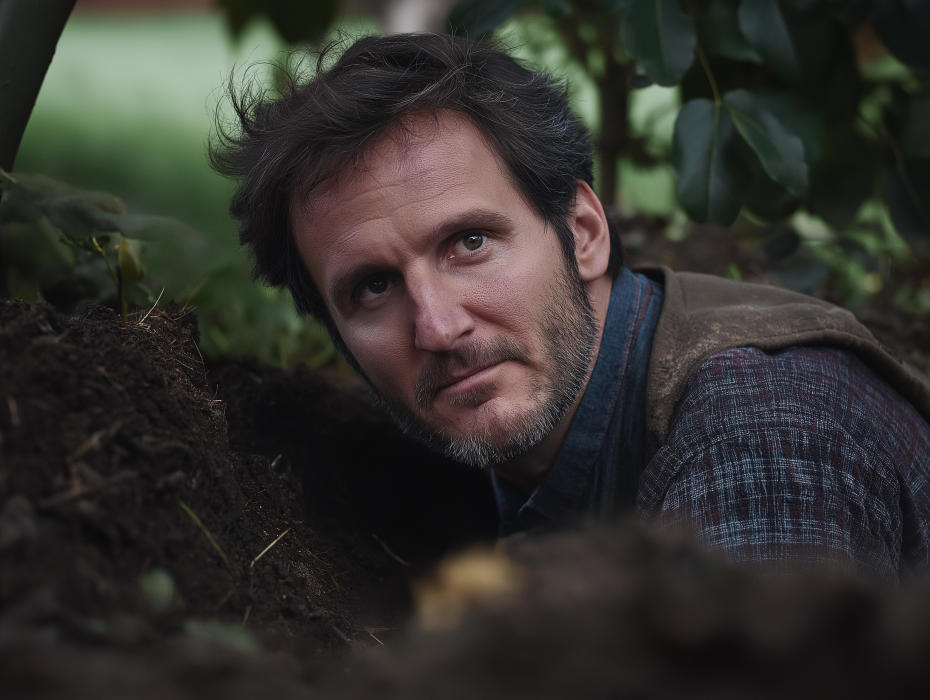
He sat on the wall, chest heaving, staring at the half-dug pit. The garden mocked him, whispering in rustling leaves. He heard his father’s voice, sharp and dismissive: Henry always loved his games. He’d drive himself mad with puzzles nobody else could understand. Was Andrew now following the same path?
Still, he couldn’t let go. That night, surrounded by scattered notes, he noticed something he had missed: a sequence of numbers aligned not with words, but with lines of the deed itself. Skipping whole sentences, the pattern shifted again, pointing him farther east—toward a patch where earth had sunken oddly.
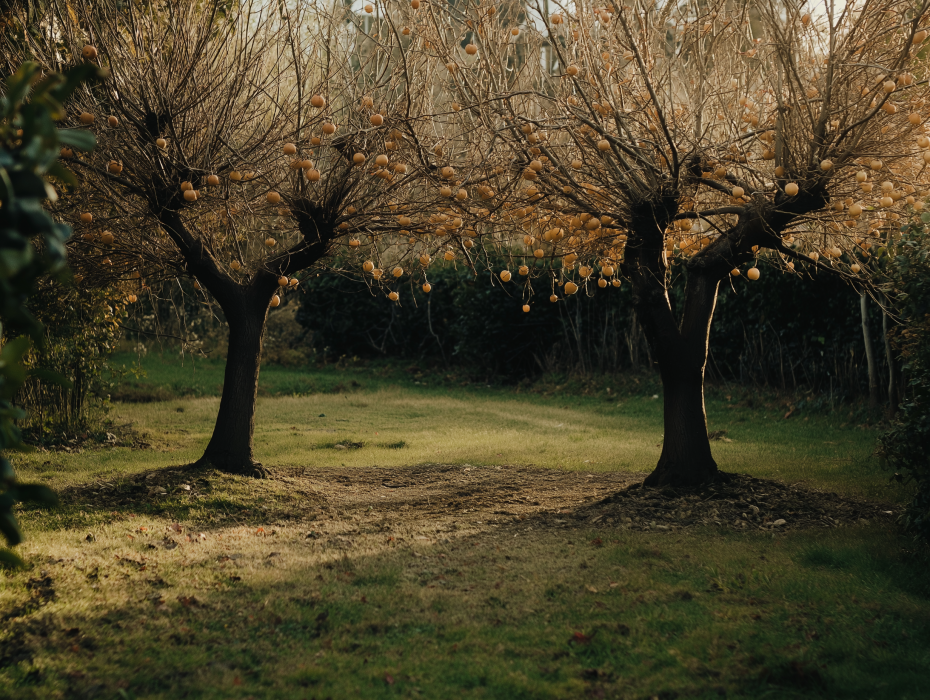
The depression lay between two leaning apple trees, their branches gnarled and lifeless. The ground looked disturbed, as if settling over something long forgotten. Andrew’s breath caught. It felt right in a way the other spots hadn’t, a final convergence of Henry’s puzzle with the land’s quiet testimony.
He plunged the spade in, dirt giving with surprising ease. This time the rhythm felt different—hollow and expectant. The soil smelled richer, loamier, untouched by decades of roots. Each thrust carried a thrum of certainty, as though Henry’s ghost guided his hands at last. Andrew’s anticipation grew with every shovelful.
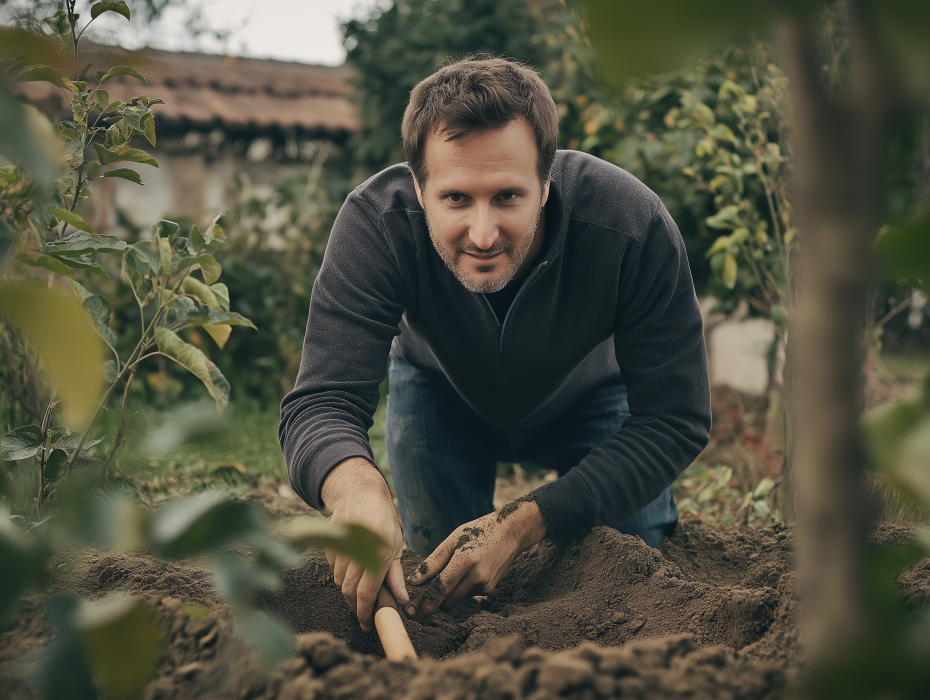
Still, doubt gnawed. What if he unearthed something worse? The thought twisted in his stomach. He saw flashes of his aunt’s broken form, Henry’s pale face at her funeral, villagers whispering. He feared the chest he sought might prove something sinister, not mystery—an answer that would shatter his family’s fragile narrative forever.
The spade struck something hard. Andrew froze, heart hammering. He knelt, scraping dirt with trembling fingers until a corner of corroded iron appeared. He gasped aloud. After days of frustration, something real lay beneath him. His pulse thundered in his ears. He had finally found it.
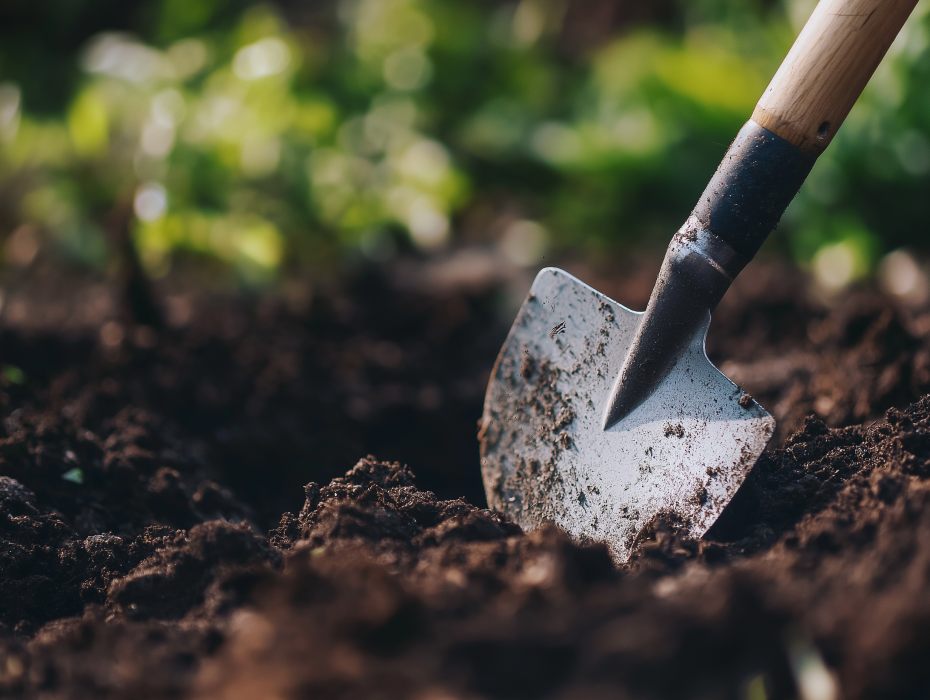
Adrenaline surged as he widened the pit, exposing more of the object: wood swollen with age, iron bands pitted with rust. It was heavy, deliberate, unmistakably a chest. His breath came ragged, disbelief and triumph colliding. All the whispers, the puzzles, the doubts—Henry had hidden something after all.
Andrew hauled it upward, soil cascading off its surface. The chest thudded onto the grass, scarred and ancient, initials faintly etched into the lid. He staggered back, panting, staring as though it might spring open itself. At last, the silence of decades was about to be broken.
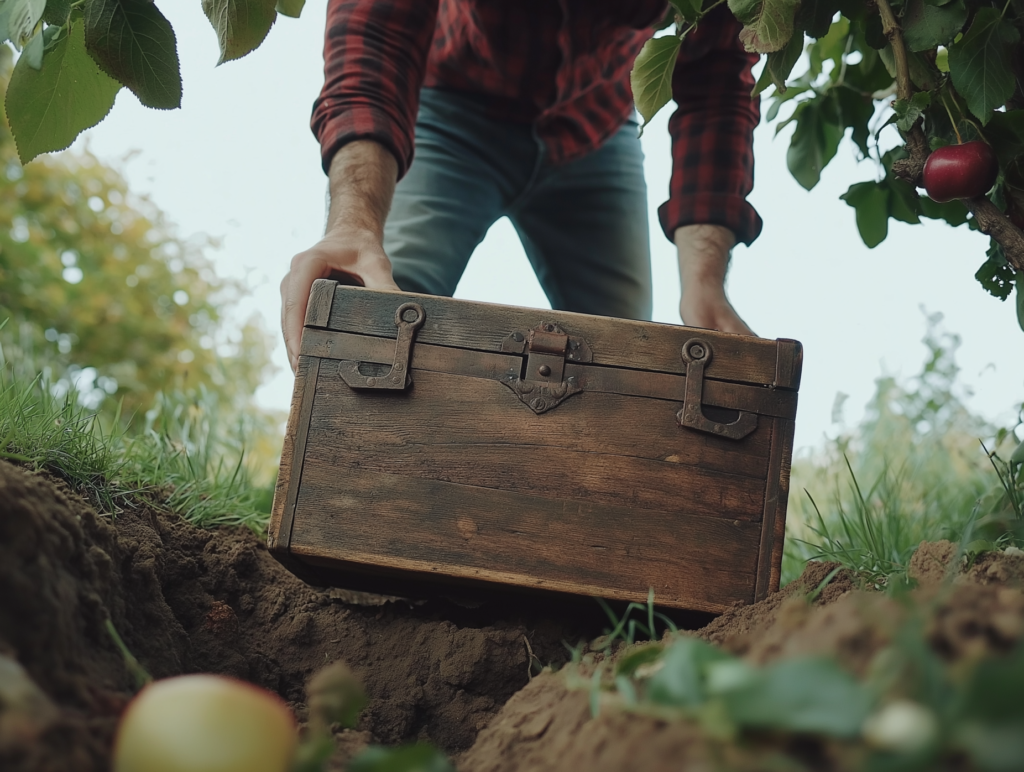
He crouched beside the chest, fingers grazing its corroded clasp. Rust flaked away like ash, staining his hands. The lock resisted, swollen shut with years of damp. Andrew sat back, heart thundering. After days of obsession, he almost feared the truth more than the endless, unanswered questions.
What if it wasn’t a treasure? What if bones filled the chest, wrapped in rotting cloth? He pictured his aunt’s lifeless body folded inside, Henry’s cold eyes watching as he sealed the lid. The image was grotesque and absurd, yet his mind clung to it with unrelenting horror.
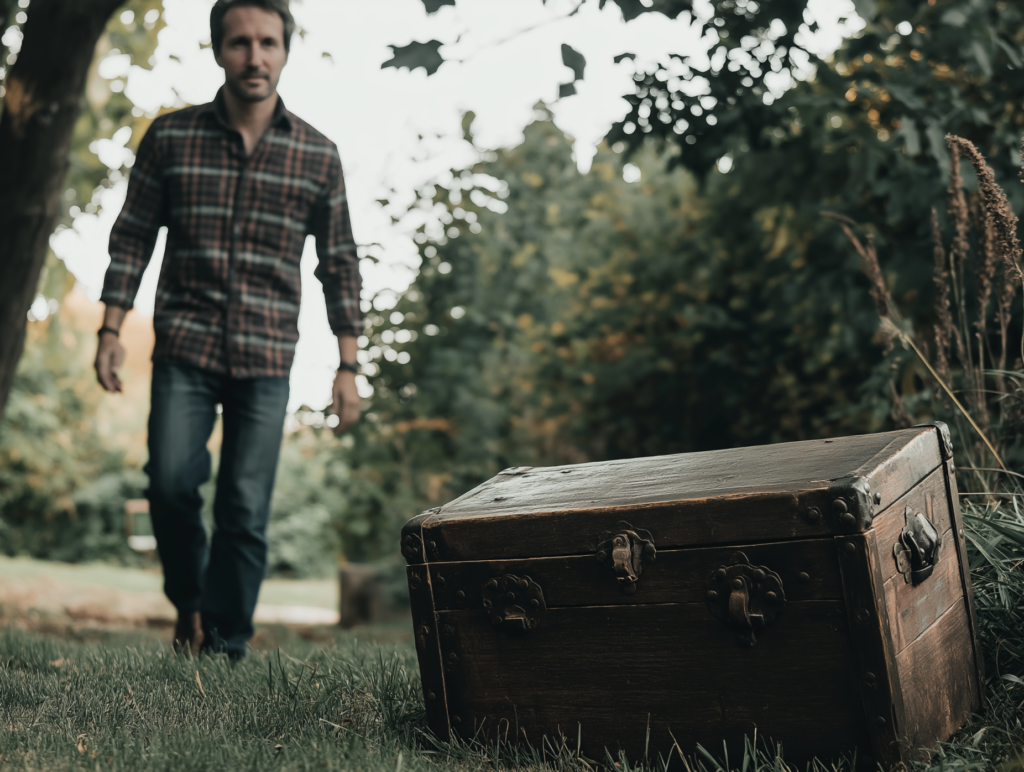
He rose abruptly, pacing the garden. Mist clung to the hedges, silence pressing in thick and heavy. “What did you hide, Uncle?” he muttered aloud. The trees offered no answer, only the creak of branches swaying. The chest loomed on the grass behind him like a malignant shadow.
Inside the house, he gathered tools: hammer, chisel, crowbar. Laying them beside the chest felt like preparing for surgery. He knelt again, sweat beading despite the chill. His hand trembled as he gripped the hammer, poised to strike. But he hesitated, gripped by the weight of anticipation.
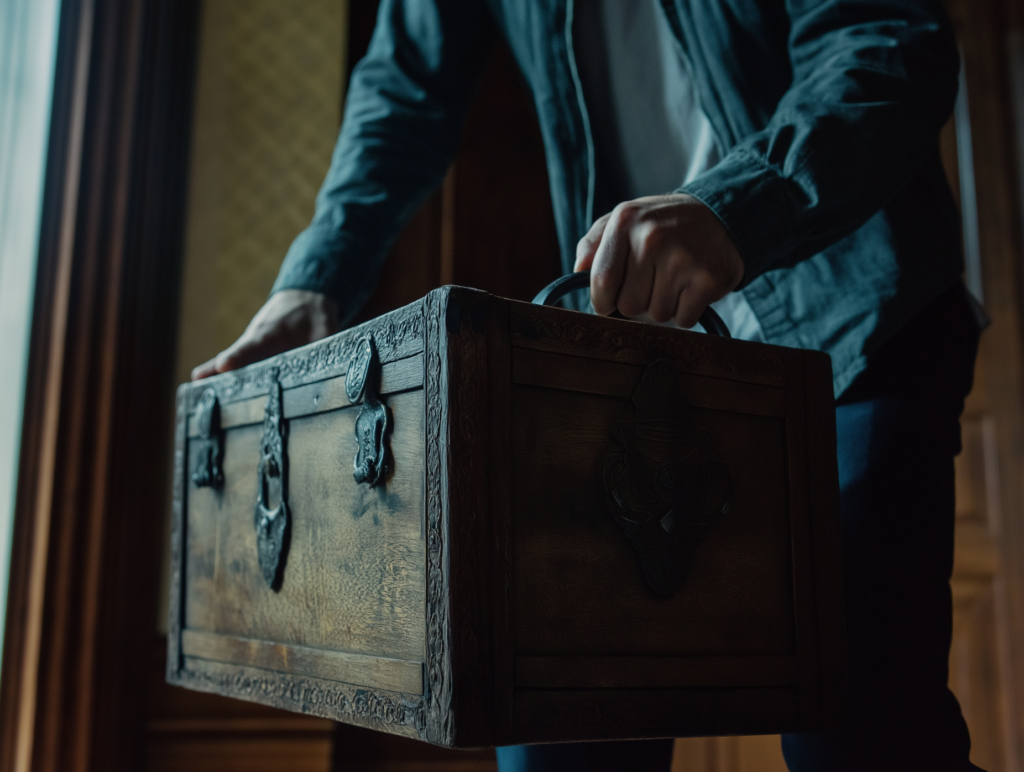
He struck once. The iron band groaned, dust rising. He struck again, harder, metal shrieking in protest. The lock trembled but held. Andrew’s arms shook with the effort. He paused, chest heaving, staring into the pit of rust as though it might swallow him whole. It became clear that this would be more than a day’s work.
Exhaustion forced him to stop. He left the chest in the hall, promising himself that tomorrow he would finish. That night, sleep tormented him. He dreamt of corridors filled with locked doors, each marked with his uncle’s initials. One door rattled violently, and he woke before it burst open.
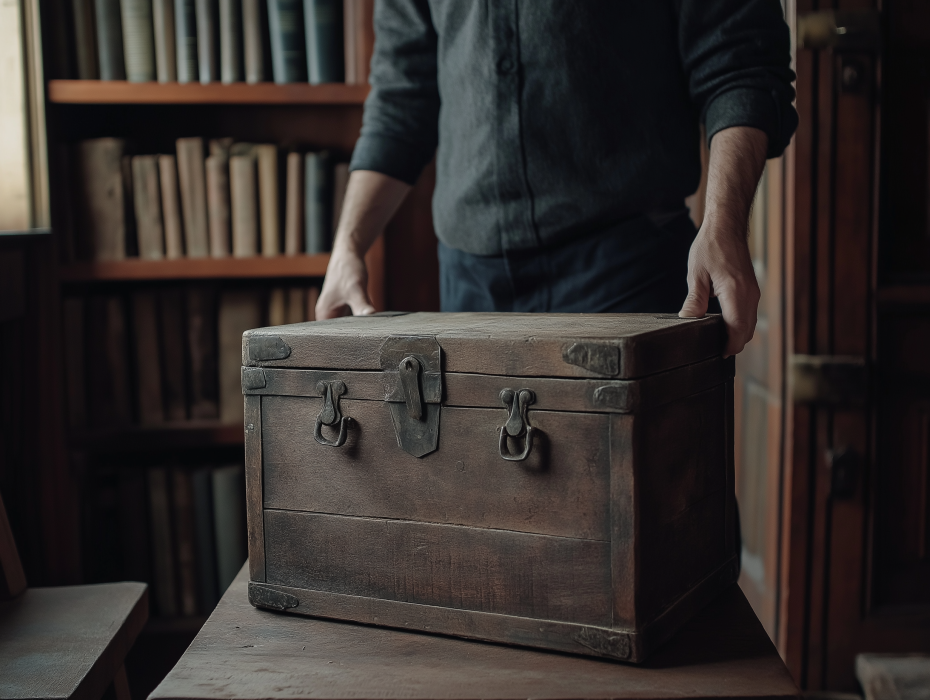
Morning sunlight revealed the chest exactly where he had left it. Relief and dread tangled in his chest. He dragged it into the study, setting it near the fireplace where Henry’s books still lined the shelves. The chest seemed to belong here, as though returning to its rightful place.
He sat opposite it, glass of whiskey in hand, watching the firelight flicker against its battered wood. He imagined Henry sitting here too, guarding it night after night, never daring to open it himself. Perhaps he’d left it for Andrew not to inherit wealth, but to inherit silence.
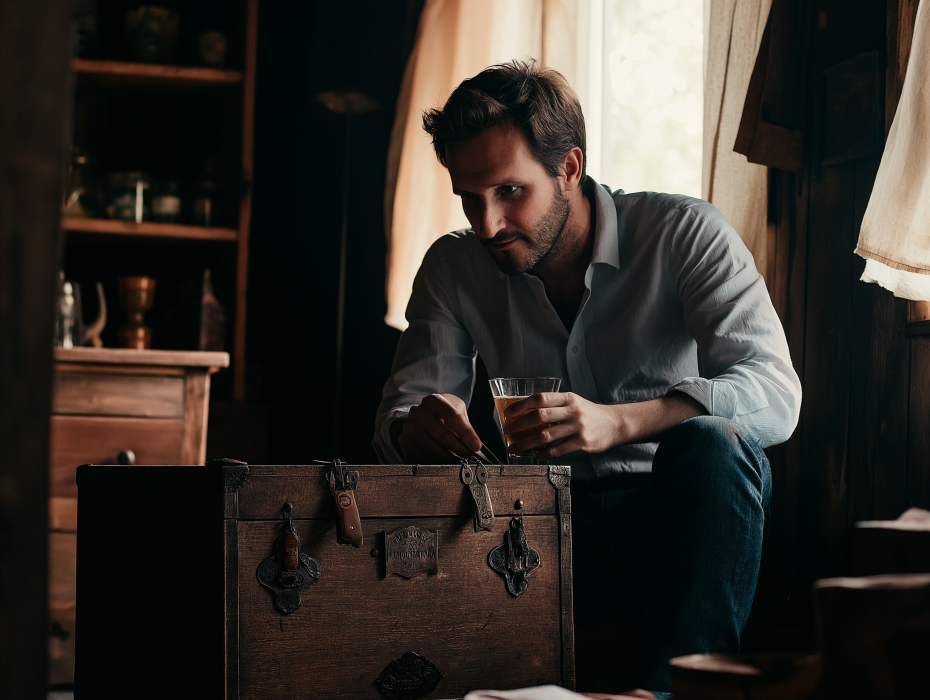
But Andrew wasn’t built for silence. The chest consumed him, searing into every thought. He leaned forward, tracing the faint initials carved into the lid. His uncle’s hand, unmistakable. Whatever lay inside, Henry had wanted it preserved. Andrew clenched the crowbar tighter, whispering, “Alright, Uncle. Let’s see your truth.”
The crowbar slipped beneath the swollen lid. Andrew braced his foot against the side, muscles straining. With a groan of protest, the clasp finally yielded, the sound echoing through the study like a gunshot. Dust spiraled into the air, heavy with the smell of mold and old secrets.
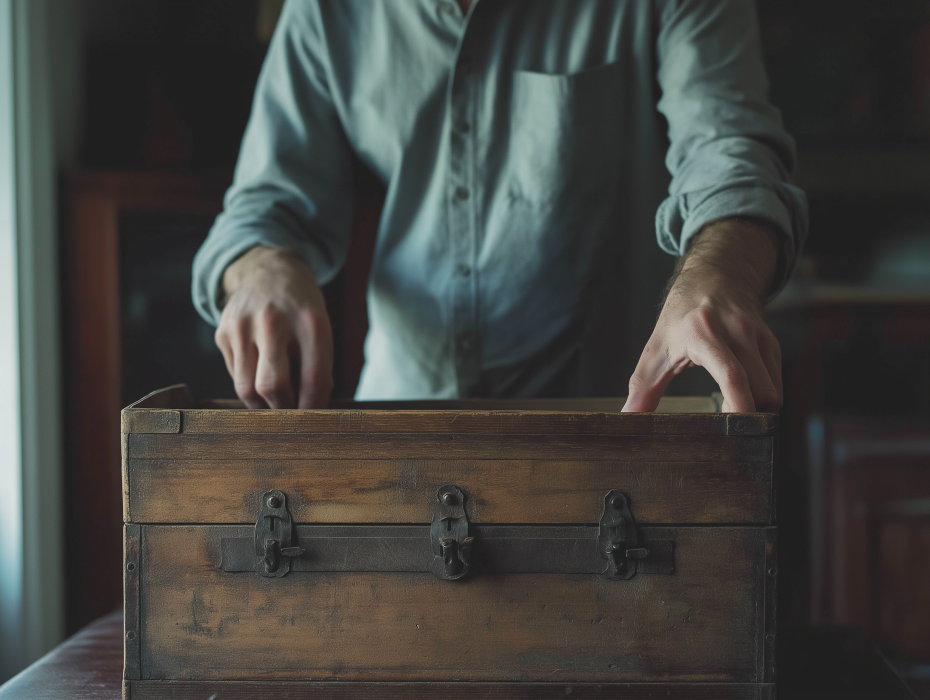
For a heartbeat, he hesitated, staring at the lid ajar. His chest tightened, breath shallow. Then, with trembling hands, he lifted it fully. Hinges shrieked. Inside lay bundles of paper, yellowed with age, tied with faded ribbon. Beneath them, leather covers winked faintly through layers of crumbling tissue.
He pulled the top bundle free. Passports. Not one, but several with different names, different countries, and different photographs of the same man. Some bore his uncle’s unmistakable face, others had subtle variations, a younger version of the same man slipping through identities. Andrew’s stomach lurched. What had Henry been doing with so many lives?
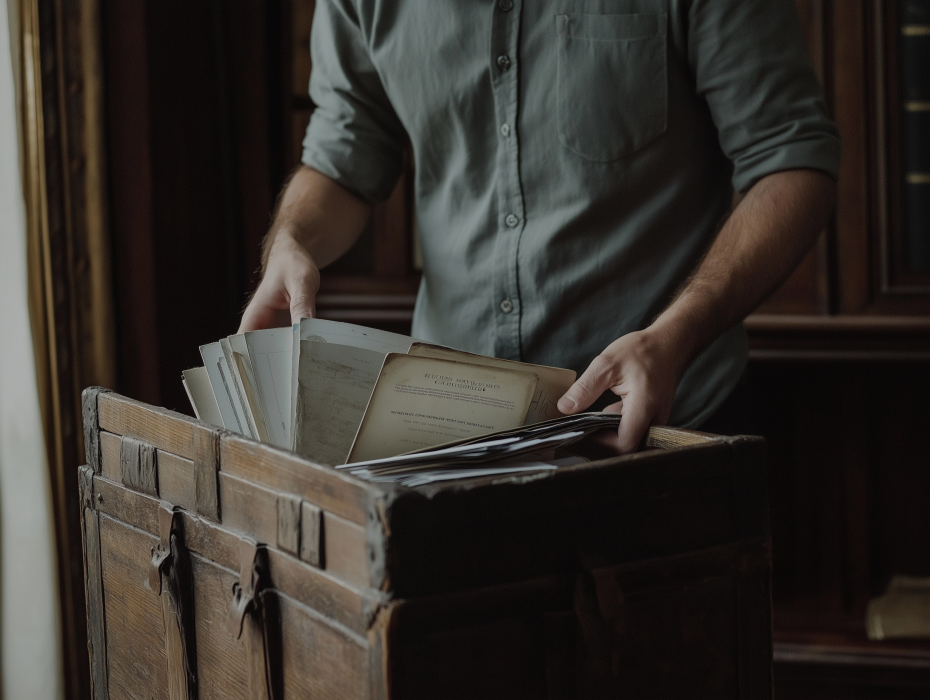
Stamps littered the pages: Paris, Vienna, Berlin, Warsaw. Years spanning the war and after. Andrew flipped through feverishly, disbelief mounting. Each passport told a fragment of a life lived in shadows, moving across Europe at times when ordinary travel was impossible. His uncle hadn’t been reclusive—he had been covert.
Beneath the passports lay envelopes sealed with brittle wax. Andrew pried one open, unfolding an official letterhead stamped with the crest of the War Office. His eyes raced across the words: appointment to cryptographic section, Bletchley Park. His uncle had been a codebreaker. The cipher in the deed suddenly made sense.
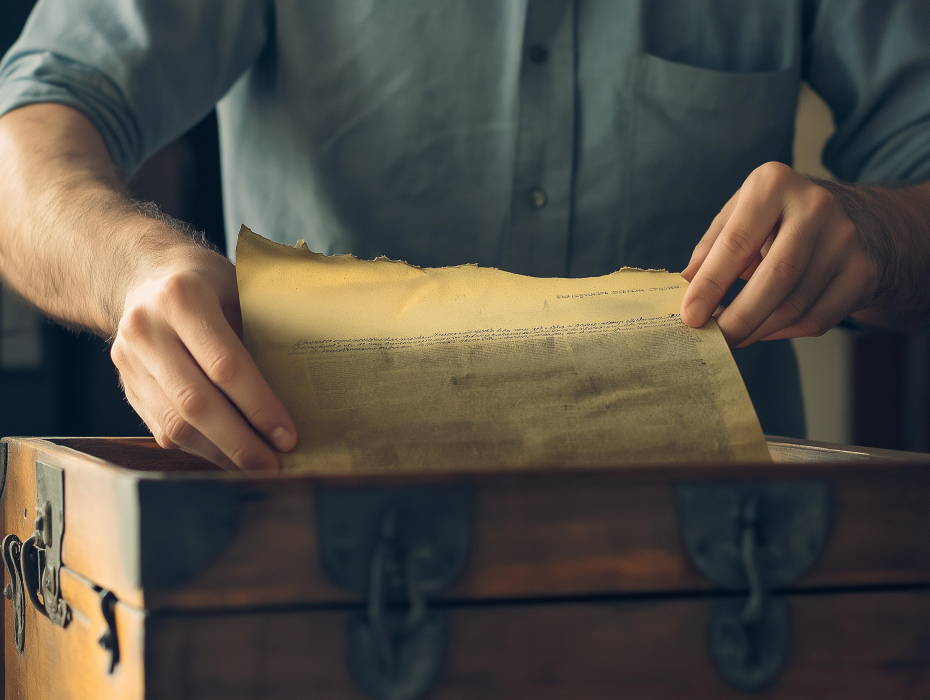
The letter described duties “vital to national security” and “requiring utmost discretion.” Andrew sat back hard, the paper trembling in his hands. The archivist’s hints, the numerical scribbles, the endless secrecy—all connected now. Henry hadn’t been a murderer hiding in shame. He’d been a man bound to silence by duty.
Further down, Andrew discovered a diary, its leather soft and cracked. The handwriting was delicate, unmistakably feminine. His aunt’s. He read passages of tenderness: meeting Henry during long nights at Bletchley, falling in love amid cryptic puzzles and whispered confidences, and their hurried marriage before the war’s end.
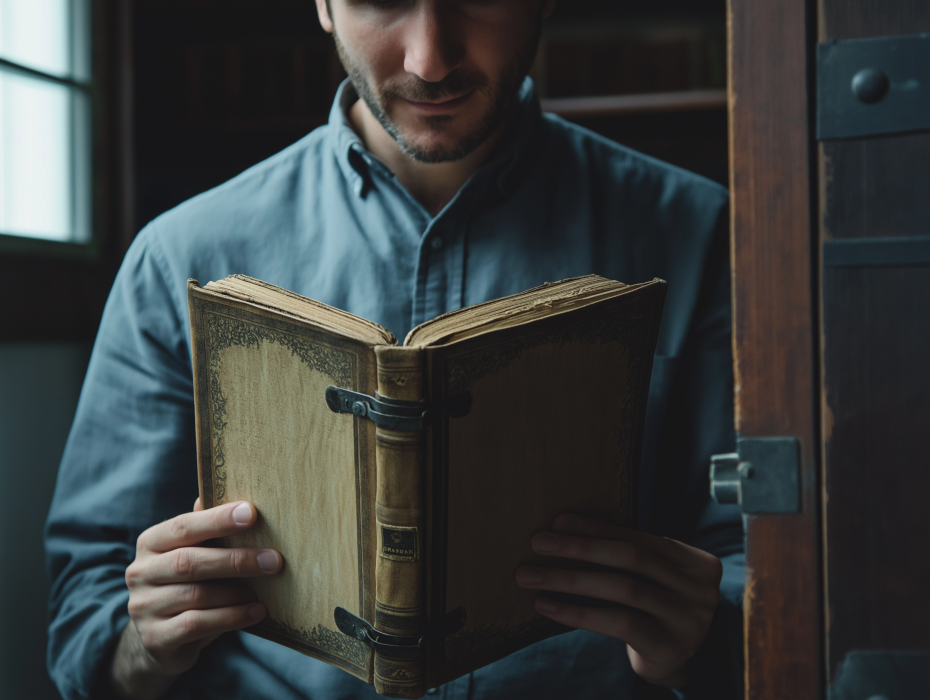
But the diary darkened too. Pages filled with fear of missions Henry undertook abroad, journeys he couldn’t explain. She wrote of lonely nights, of waiting by the window, of a creeping dread each time he returned altered—colder, more watchful. Love remained, but shadowed by secrets she couldn’t fully grasp.
Tucked between pages was a faded photograph of Henry in uniform, arm around his young wife, both smiling despite the war etched behind their eyes. Andrew felt his throat tighten. This was no tale of cruelty. It was one of sacrifice, of a couple carrying burdens too heavy for ordinary lives.
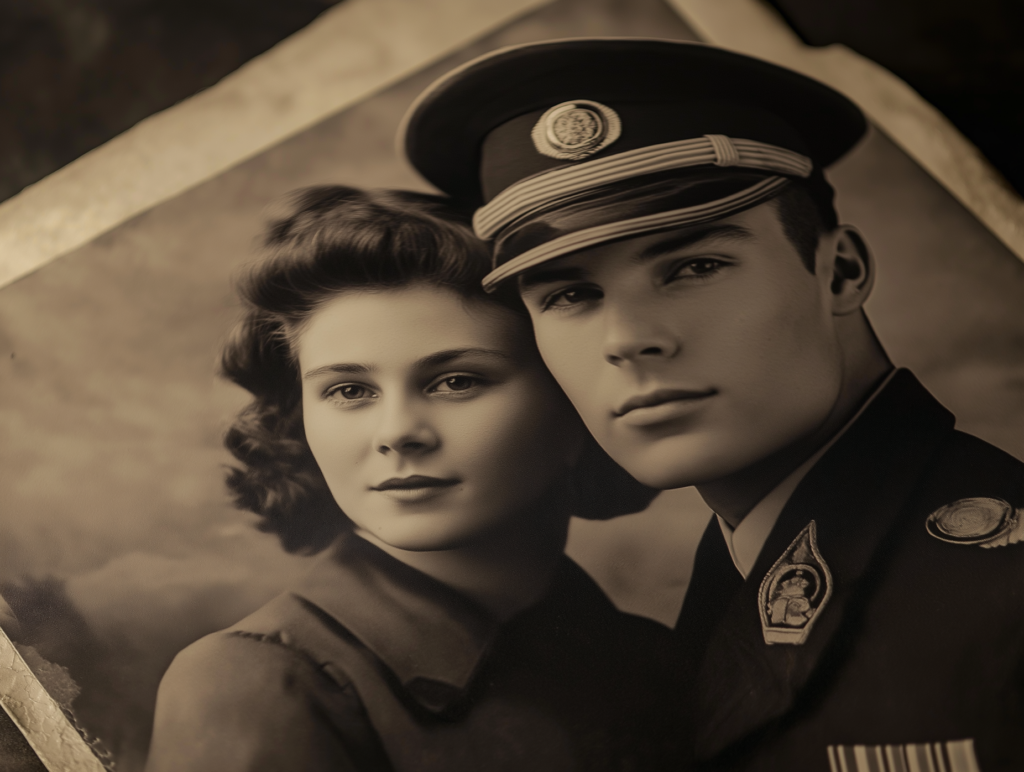
At the very bottom of the chest lay a bundle of notes, currency from different decades, stacked neatly. A small fortune, untouched. And finally, sealed in an envelope marked For Andrew, a letter in Henry’s familiar hand waited. Andrew’s fingers trembled as he prepared to unfold his uncle’s last confession.
Among the documents and money in the chest lay a small brass key, tarnished with age. A tag was tied to it with faded string: East Wing. Finally, Andrew sighed with relief, pulse quickening. At least, the secret in the locked corridor would no longer be a mystery. He would be spared opening the locks by force.
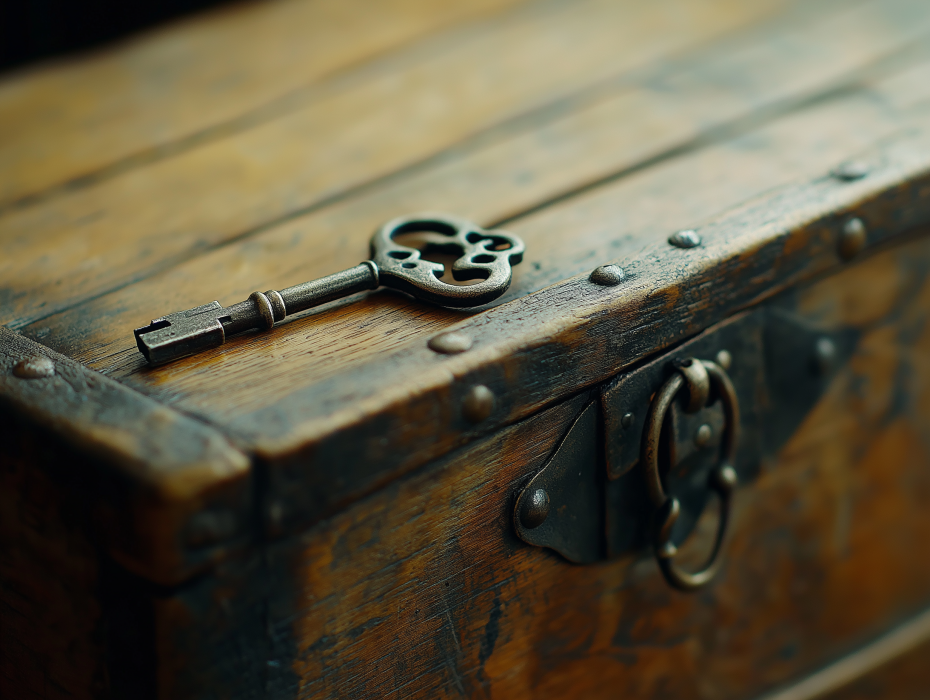
But first things first, Andrew broke the wax seal gently, as though afraid the words might disintegrate. Henry’s handwriting, steady but faint, filled the page. “If you are reading this, Andrew, you have solved the garden puzzle. I always knew curiosity ran in our family. What you found here is my real life.”
“The world knows me only as a professor. But before that, I served in silence. At Bletchley Park, we cracked ciphers that helped turn the tide of war. Later, I carried those skills into Europe, traveling under false names, bearing passports you now hold. They are from a time you may not fully understand.”
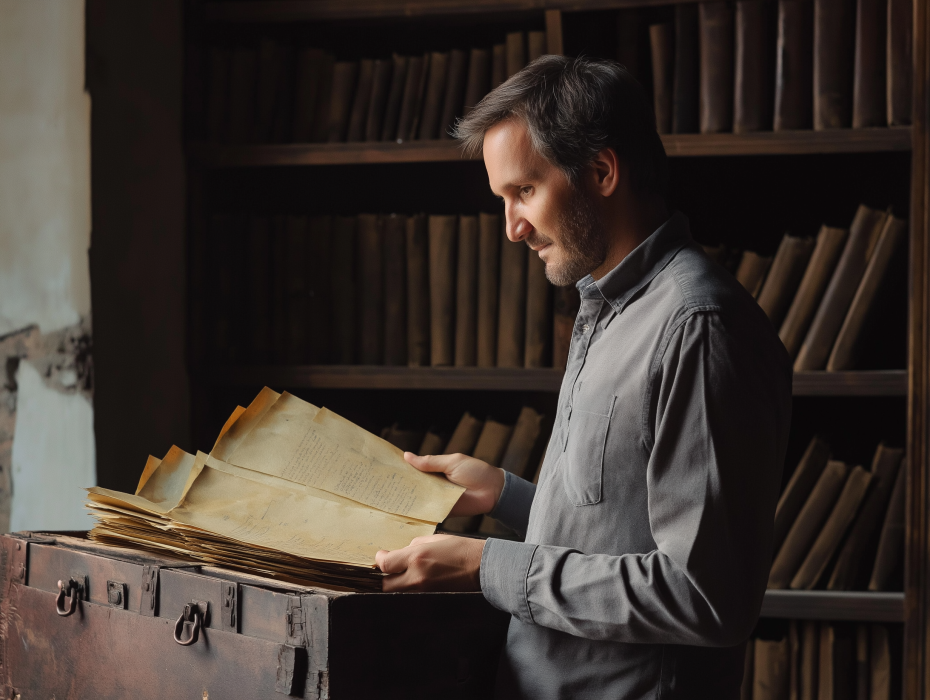
“Your aunt was my light. We met among codes and secrecy, yet built something beautiful. Her death was an accident, cruel and senseless. Rumors painted me darker, but truth never mattered to tongues eager for scandal. I buried my grief and, with it, and much of who I was.”
Andrew’s eyes blurred. He read on. “I could not destroy these documents, nor could I flaunt them. The world has little appetite for unsung heroes. So I left them here, hidden, until someone willing to bear the truth unearthed them. I don’t want glory—but I hope you will understand me better, my heir.”
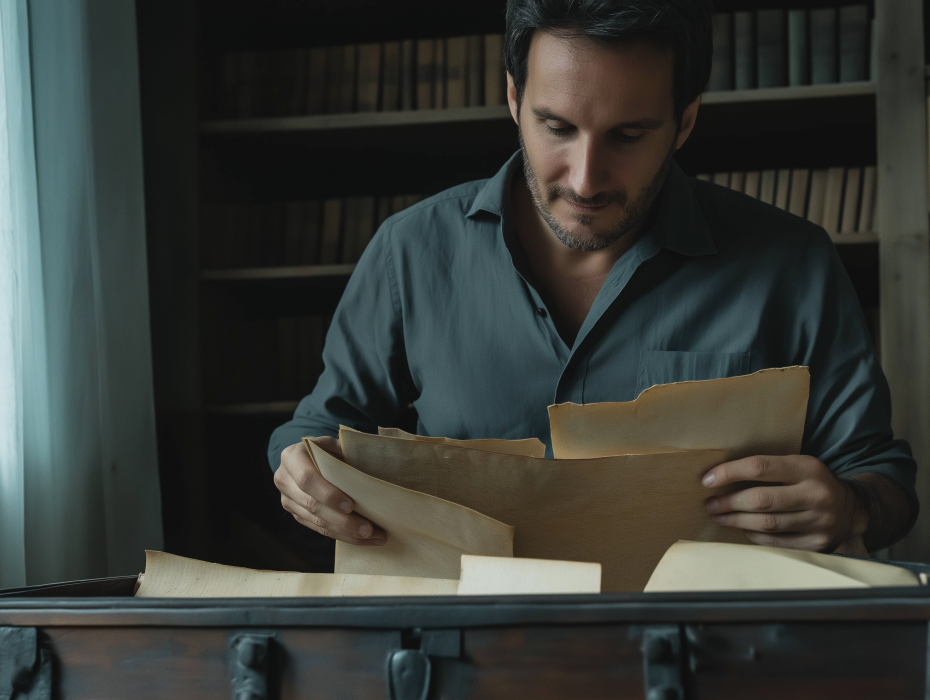
“The money you find is modest savings, kept aside for you. Not because I wish to burden you with wealth, but because I know the estate will weigh heavily. Sell it, rebuild it, burn it down—it matters little. What matters is you understand the silence that defined me.”
“Do not chase my shadow into darker corners. Do not imagine treason or murder where there was only loyalty and loss. Remember me as a man who loved, who served, and who carried grief too quietly. That is the truth, Andrew. That is all I ask you to keep.”
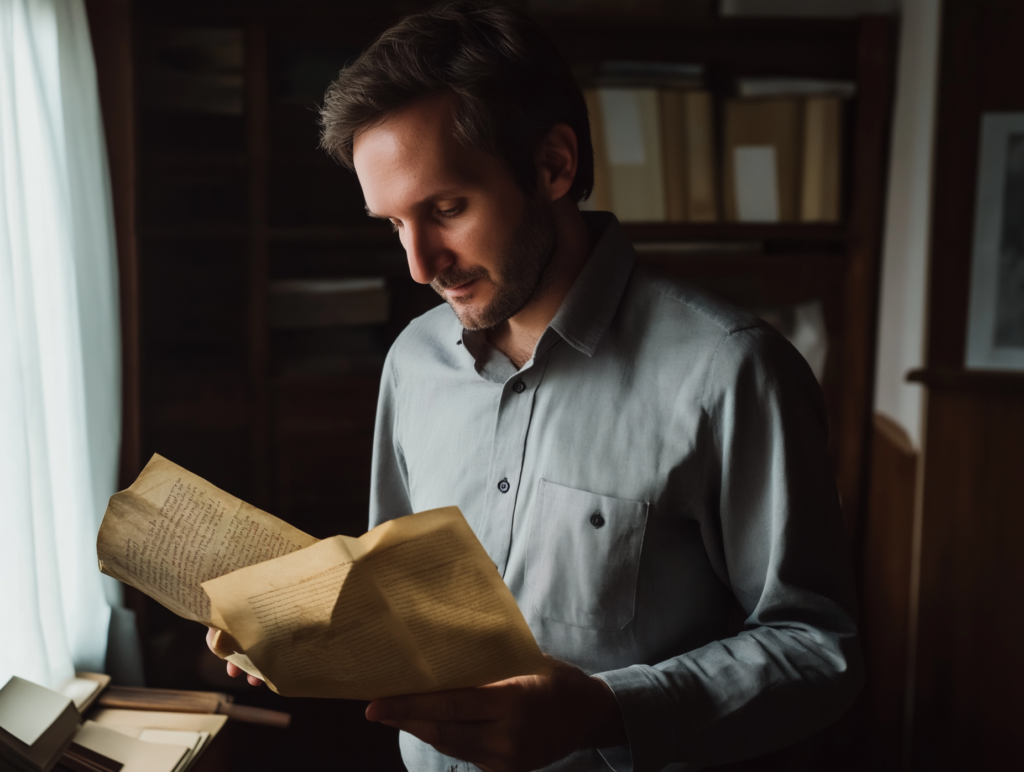
The letter ended there. Andrew lowered the page slowly, tears prickling his eyes. The chest before him no longer felt ominous but intimate, a vessel of love and loyalty, not guilt. The passports were artifacts of duty, the diary of devotion, the money a quiet act of care.
He looked around the study, the sagging shelves, the dust thick on Henry’s books. For the first time, the silence of the estate seemed less suffocating. It was simply the echo of a man who had borne too much alone, leaving behind a puzzle as explanation, not condemnation.
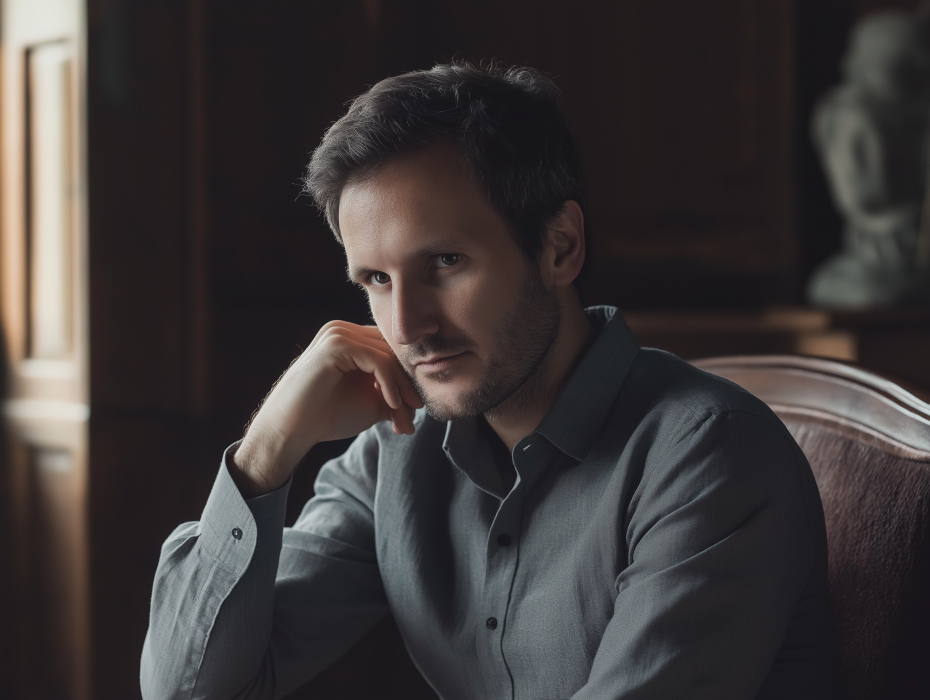
Andrew gathered the documents carefully, wrapping them in cloth. He would not parade them for acclaim, nor bury them again. He would preserve them quietly, respecting the life Henry had chosen. The garden had given up its secret, and with it, Andrew had reclaimed his family’s true story.
The lock to the East Wing yielded reluctantly. Inside, dust veiled a room frozen in time. Dresses hung neatly, perfume bottles lined the dresser, and a photograph of his aunt smiled from the mantel. It was no crypt of guilt but a shrine of love—Henry’s way of preserving her presence long after her death.
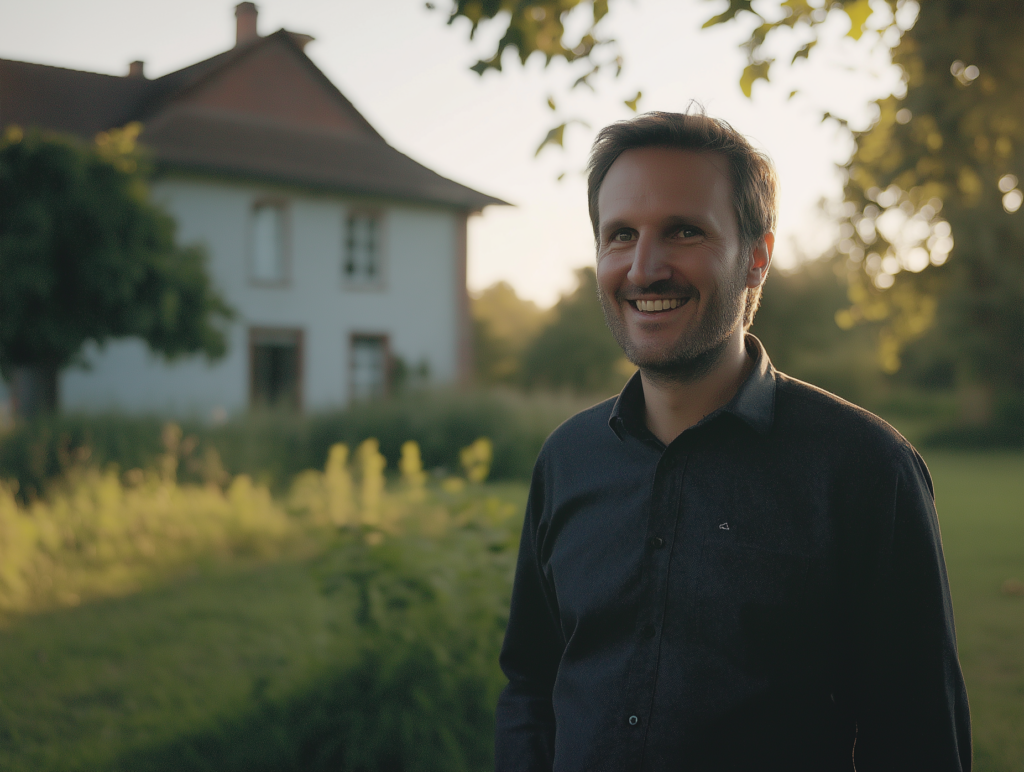
That night, he stood by the crooked oak, staring at the dark earth. The hole gaped silently, but the weight on his chest had lifted. Andrew whispered into the night, “I understand now, Uncle.” The estate still loomed broken and alien, yet now it held meaning. What he had inherited was not ruin or rumor, but truth, and in that truth, peace.
